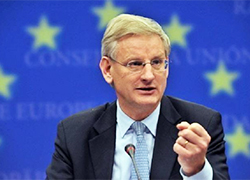Carl Bildt: Our position remains firm
31- 11.07.2013, 8:19
- 23,408

Minister of Foreign Affairs of Sweden gave exclusive interview to charter97.org.
Carl Bildt is known for his consistent and principled position towards the Lukashenka regime. After the events of 19 December 2010 the minister was one of the co-authors of the much-talked-of article ‘Lukashenka the Loser’, in which the heads of the foreign ministries of Sweden, Germany, Poland and Czech Republic claimed that the Belarusian dictator lost the presidential elections.
Today the head of Swedish MFA answered to the questions of the charter97.org web-site’s editor-in-chief Natallia Radzina.
- Mr.Minister you were the first European politician who met with me after my imprisonment and after I had to flee the country. It was a strong support for me and I see you as a person who cares for life and fate of every political prisoner. Today we again hear the voices of advocates of «realpolitik» as regards Belarusian regime? What is your attitude to that?
- The European Union has been consistent in its policy towards Belarus, in upholding a principled approach, not least when making clear public statements on what we think of the fact that Belarus still today, in 2013, in the middle of Europe, holds political prisoners. In fact the EU’s policy in the Eastern Partnership as a whole is fundamentally a values based policy. We know that the EU’s recipe for cooperation, development and growth has a strong attraction on our neighbors, the evidence of this being that they seek a closer cooperation with the EU. Our policy is to be open to deepening our cooperation with our Eastern European partners, including with Belarus, provided that we see commitment to the shared values of democracy, rule of law and respect for human rights on which the EU is founded.
- On December 23 together with Radek Sikorski, Guido Westerwelle, Karel Schwarzenberg you wrote an article «Lukashenko the Loser» published in the New York Times in which you accurately assesed the situation in Belarus and stated your position of principle towards the dictator Lukashenka. Why it has not become a basis for European policy on Belarus?
- I would actually argue that many of the thoughts that were articulated in this article did indeed help shape the steps taken by the EU, the most evident sign of this being that the EU sanctions on Belarus were tightened to an unprecedented level. These sanctions and the EU policy of critical engagement towards Belarus remain in place today.
- Sweden does a lot to support democracy in Belarus. I would like to use this occasion and thank you for the support of charter97.org web-site. This support becomes less effective when EU undertakes attempts to «engage» the dictator. In the late 80s early 90s Sweden strongly supported Baltic states fighting for their independence and democracy. At that time nobody suggested any kind of dialogue with the totalitarian regime. Maybe it's worth to go back to that experience as regards Belarus?
- The main characteristic of the EU's policy of critical engagement is that it combines an articulated and principled values based approach, with a certain level of engagement and cooperation with Belarus. Sweden and the EU has never believed that we can try to isolate Belarus or refuse to engage in a dialogue with Minsk, thinking that this would lead to a positive development. The recent decision to suspend the application of the visa ban for Belarusian Foreign Minister illustrates this. It was Belarus that created this situation of self-imposed isolation, by deciding to appoint a person to this post that was already subject to sanctions. Nevertheless we don’t believe that an embargo on diplomatic contacts with Belarus will lead us forward. This is why we agreed, for now, to suspend the visa ban.
- You were one of the authors of Eastern Partnership programme. What do you expect from Vilnius Summit of EaP and who do you think can represent Belarus there?
- When reviewing Belarus in relation to the achievements of some other Eastern Partnership countries, the great unfilled potential of the EU-Belarus relation becomes obvious. This is one of the main benefits of having Belarus at the table at Eastern Partnership meetings. At the Vilnius meeting we will for example move closer to open up Deep and Comprehensive Free Trade Areas for four of our partner countries, while the cooperation with Belarus remains underdeveloped, awaiting steps from Minsk that could start unlocking its potential.
- Does EU have a strategy and political will to help Belarus to become free and democratic?
- The EU strategy on Belarus is the right one, and I do not think the EU intends to change it. In the long run we can only contribute to positive change in Belarus by maintaining our firm stance on the need to respect fundamental values. We also need to show our readiness to, once Belarus is ready to take the necessary steps, develop our relation to Belarus as we have done with other partners in the region.








